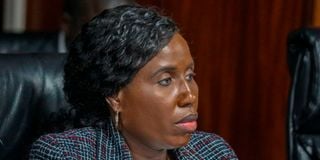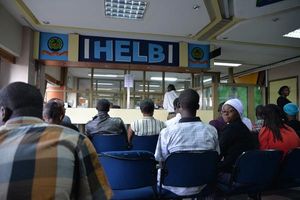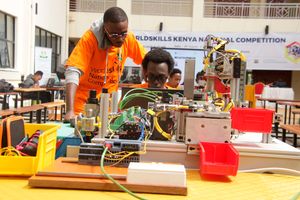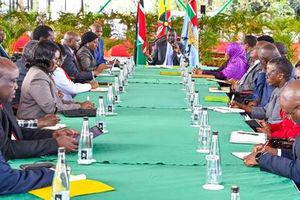
State Department for Higher Education and Research PS Beatrice Inyangala when she appeared before the National Assembly Committee on Education on June 4, 2024.
Members of Parliament on Tuesday, June 4 made Higher Education and Research Principal Secretary Beatrice Inyangala commit to withdraw admission letters of students expected to join university until the exact amount the learners are to pay as fee is established.
More than 19,572 students did not take up their chances at university last year despite having been placed, in what lawmakers attribute to “inefficiency” of the new higher education financing model.
The opposition Azimio La Umoja One Kenya Coalition has called for the scrapping of the funding system, saying it favours students from wealthy backgrounds.
National Assembly Committee on Education Chairman, Julius Melly, yesterday said his team has visited public universities and established that 10 to 15 per cent of students placed failed report.
Last year, some 130,485 students were placed to the institutions by the Kenya Universities and Colleges Central Placement Service (Kuccps). The number this year is 134,743.
“This committee went round and received complaints from universities, students and parents about the funding model,” Mr Melly said during a sitting with the PS, Kuccps Chief Executive Agnes Mercy Wahome, Universities Fund (UF) boss Geoffrey Monari and Higher Education Loans Board chief Charles Ringera.
“Some parents were shocked to see the fee structure and asked their children to choose something else.”
Mr Ringera said funding agencies are owed Sh29 billion for support to students in the current financial year that comes to an end in three weeks.
Under the model, a student applies for scholarship and loan after receiving an admission letter from the university she or he has been placed.
The 2023 Kenya Certificate of Secondary Education examination candidates expected to join university in August and September got admission letters following the announcement of placement results last month.
The letters indicate the total cost of the programmes without indicating the amount students will get in form scholarships or loans. The annual tuition fee for degree courses ranges from Sh144,000 to Sh760,000.
Other expenses like accommodation and upkeep are not included.
The Daily Nation reported yesterday that learners are being forced by circumstances to choose courses they can afford rather than what they qualified for.
Some students who qualify for degree courses opt for diploma instead.
Mr Monari told the committee that 9,726 students lodged appeals against their categorisation last year.
Of these, 4,087 were moved to higher bands after providing new information.
There has been no follow-up on whether the unsuccessful 5,639 learners joined the courses they had been placed by Kuccps.
He added that more than 28,000 students did not seek funding from his agency.
Kabondo Kasipul MP, Eve Akinyi Obara, said university administrators told the committee during the visits that the Means Testing Instrument (MTI) used to categorise students is not effective.

Universities Fund Chief Executive Officer Geoffrey Monari appears before the National Assembly Education Committee at Continental House Nairobi on Tuesday, June 4, 2024.
“The MTI isn’t watertight. Get data from the universities on students who have dropped out and effect affirmative action immediately,” she said.
The MPs questioned the information used to classify students. The MTI uses information collected from the Kenya Revenue Authority, the National Hospital Insurance Fund, Kuccps, the Kenya National Bureau of Statistics, telcos, the Ministry of Labour and Social Protection, the National Employment Authority, Elimu Scholarship, the National Transport Safety Authority, the National Education Management Information System and the Integrated Population Registration Database.
However, the committee said many students deserving government support have been left out.
“The variables aren’t working. Your figures aren’t adding up and you are relying on wrong information. We don’t want to put our country on a lie,” Mr Melly said, sentiments echoed by Kibra MP Peter Orero.
Kuccps will open the system for inter-university and inter-programme transfers this morning.
Dr Wahome said a student placed at a private university but wishes to be at public institutions can apply for change at no cost.
She added that 18,558 students have been placed to private universities. This is double the 9,622 learners who were placed by Kuccps in 2023.
Kitutu Masaba MP, Clive Gisairo, suggested that the application for courses be linked to the application for funding so that fee structures only indicate household contributions.
The funding model categorises applicants into five bands.
Band One comprises students from households whose monthly income is below Sh5,995.
Those in Band Two come from families with monthly income of Sh5,995 to Sh23,670 while those from households earning Sh23,671 to Sh70,000 are in Band Three.
Band Four comprises students from households of Sh70,001 and Sh119,999 monthly income while those earning Sh120,000 are in Band Five.
In an interview with the Daily Nation in Mombasa, National Assembly Minority Leader Opiyo Wandayi said the government needs to ensure and promote equity and equality in funding university and college students.
“The policy on education has crumbled and doesn’t make sense. Unless you can put in place proper mechanisms to adequately fund education, you have failed as a government. The funding model has only succeeded in making things worse,” the Ugunja MP said.
“We have not seen positive results because the system was rushed. Students and their parents are finding it difficult to access money.”
He said opposition MPs are outnumbered in the National Assembly and could therefore not undo the model.
“We continue to voice these concerns and express ourselves robustly. We hope reason shall prevail and the government will see the sense to do what is right,” Mr Wandayi said.









